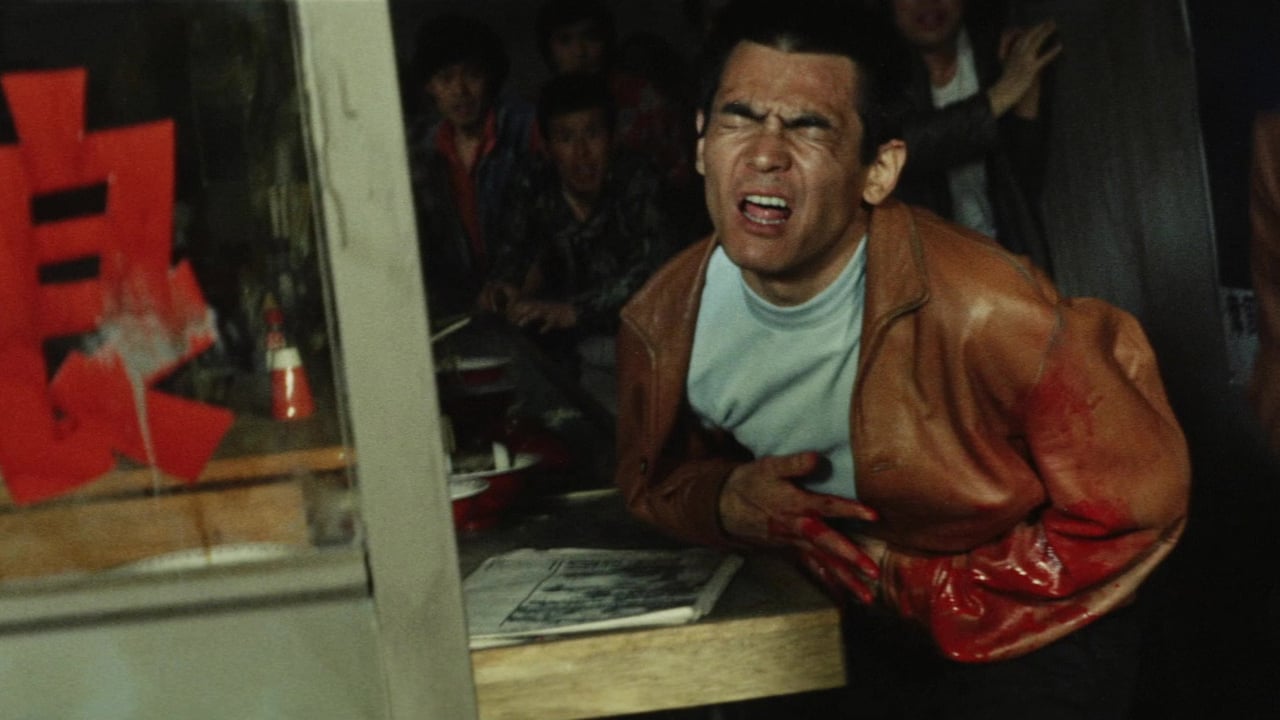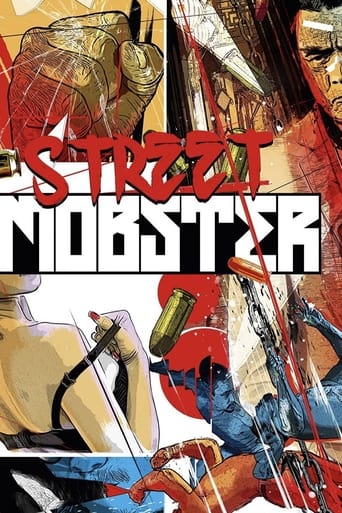

Sorry, this movie sucks
... View MoreClever, believable, and super fun to watch. It totally has replay value.
... View MoreEasily the biggest piece of Right wing non sense propaganda I ever saw.
... View MoreThere are moments that feel comical, some horrific, and some downright inspiring but the tonal shifts hardly matter as the end results come to a film that's perfect for this time.
... View MoreThis was the first movie i have watched from legendary Japanese director Kinji Fukasaku, as a big lover of Takeshi Kitano and his yakuza movies, i wanted to discover older classic Japanese yakuza movies, i have first watched works of Seijun Suzuki, after that i started with Fukasaku's movies, Street Mobster is fantastic movie, it is very fast paced movie, full of brutal violence, killings, nudity, it must be very schocking at that time, but what i most loved about film is main actor Bunta Sugawara, he is so good in his role of the main street punk Okita, he must be tough guy in a real life, also i must admit this is very different movie from other yakuza movies i have seen because the main protagonist wants to be independent from other yakuza syndicates, he doesn't wanted to be rich, he only wanted to be free, tough, to fight other guys and gangs, to be himself.I am recommending this movie to anyone interested in older Japanese movies, crime fiction and yakuza topics my rate 7.5/10
... View MoreAs can be expected from Japanese master Kinji Fukasaku, "Street Mobster" is a fast paced, stylistic and violent depiction of a low level Yakuza thug who punches to the beat of his own fist.Bunta Sugawara plays Okita, a small time hood recently released from prison. Upon his arrival to the outside world, he finds the underworld he left behind changed. A new crew runs his old stomping grounds, and he is lost and abandoned. After teaming up with some hoodlums, Okita sets his sights on bigger things, which all leads to his downward spiral in the Japanese underworld. Fukasaku directs this Yakuza flick with his usual visual tour de force. You can expect freeze frames, quick cuts, fast zooms, hand- held camera work, dutch angles, voice overs, a mixture of b&w and color cinematography, etc. The energy that the director supplies from behind the camera perfectly captures the momentum in which the lead characters react to their daily lives. There is a lot of action, with characters often breaking out into fights and chases at random. This kind of film needs to be taken with a grain of salt. The violence, like the melodrama and tacked on love interest, are over the top but enjoyable. So sit back and relax. This lean, mean, fast flying fist machine of a film will keep you entertained and enthralled throughout.
... View MoreStreet Mobster is among my favorite yakuza films, and from one of my favorite Japanese directors. This is a great, less-popular Fukasaku film, and it really deserves more attention.Okita is our "hero", if you can call him that. He's hot-heated, violent, and unapologetic. I can't think of a time in the film where he really shows restraint. He's just such an over-the-top, punk rockin' character who doesn't care about rival gangs or other thugs; he wants to do what he wants, when he wants to. And that's definitely the driving force behind the film, it's explosive nature. It's so unglamorous and filthy at times, and yet you have this sense of a man living his life, maybe not to it's full potential, but having a hell of a lot of fun doing what he's doing. And maybe he's not even enjoying it, everything else is just too conformist for him. He simply doesn't back down. So he really is a hero, a hero to the downtrodden. A counterculture icon, a raging machine.With it's boisterous protagonist comes a slew of background characters who are really just there to make Okita the centerpiece. Aside from the prostitute that he raped years earlier and now forms a bond with (Whose name I can't even remember!) there are few other noteworthy characters. And that's really okay. When they speak, they speak to get Okita's reaction. If you don't like Okita, then you're probably not going to like the film. Me, I enjoyed this rebellious, non-conformist gangster, yelling and picking fights. It was just so over-the-top and the director clearly embraced the punk style that was emerging at the time of this film's release.Speaking of release time, I just watched the film again a few minutes ago, and I still can't believe it was made in 1972. I'm sure you've heard it before, but it's way ahead of it's time. It looks 90s-ish to me. The shaky-cam and jump cuts stand out most as then-foreign techniques. Of course, now they've become the norm in films.So that's my short review. I don't feel that there's a whole lot more ground to cover as Okita is really the main attraction. So if you're looking to kill 87 minutes and consider yourself a fan of exciting cinema, look no further than Street Mobster.
... View More"Street Mobster" is part of the early 70's crop of Japanese yakuza films that were spearheaded by Kinji Fukasaku, who is once again behind the helm without missing a beat. All the mandatory elements that make a yakuza film work are present: forming and switching of alliances between yakuza families, fistfights, stabbings, a guerilla view of Tokyo, frenetic action sequences, sleaze. But whereas a lesser, more workmanlike director would work these things from a checklist, Fukasaku instills so much energy that even the most rudimentary of things are a pleasure to watch.Indeed "Street Mobster" is packed full of raw, animalistic energy that more than makes up for the fairly predictable nature of the story. In typical yakuza fashion, yakuza gets out of prison after doing time for a hit, forms a small gang, takes on the bigger families, carnage ensues. It's all part of what makes the genre such pure, unadulterated fun though. However all these typical genre staples take a wildly exhilarating life of their own through Fukasaku's hyperkinetic and gritty style. There's no glamour or glory to be found in Fukasaku's violence: only brutality. Stylization is kept to a bare minimum with lots of hand-held shots and cameras constantly on the move that blend in with the action. The same guerilla tactics are used for the exterior shots that capture the seedy, downtrodden side of a Tokyo full of possibilities. Dilapidated warehouses, cheap bath houses, dark rooms, dim-lit diners, rundown neighborhoods with wooden cabins, again there's no glitz or neon lights shining in Fukasaku's yakuza universe.Regular collaborator Bunta Sugawara takes on the role of the titular Street Mobster, but gone is his cool (and sullen) demeanor from other yakuza films. He's responsible for some serious scenery consumption, wildly overacting, often approaching even Kikuchiyo territory (Mifune's character from Seven Samurai) but with the same honest, natural approach that made him the great actor that he was. He's also one of the best physical actors I've seen and you can see it paying off in dividends with every fight scene he gets involved with (and there are lots, don't worry).If you'd like to see a different kind of gangster film, one that relies more on viscera, grittiness and raw energy than faux glamour and hip mafiosos, you should definitely invest in Street Mobster. It's pulpy, fast-paced and balls-out. 70's Japanese action cinema in top form
... View More